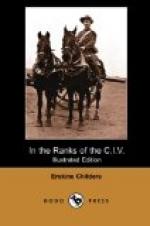June 23.—I woke early and chatted to the Lancers’ cook over a roaring wood fire till reveille. Orders came to start at two, as part of the escort of a convoy going to Lindley, distant about fifty miles east. Something real to do at last. Quiet morning; sewed buttons on. At one “boot and saddle,” and at two we started and joined the convoy, a long train of ox-waggons, with some traction engines drawing trucks. Our officers are Captain Budworth (in command) and Lieutenant Bailey, just as at Piquetberg Road. The troops with us are some Buffs Militia, Yorkshire Light Infantry, Australian Mounted Infantry (Imperial Bushmen Contingent), and some Middlesex Yeomanry. Went through the rambling white desolate town, forded a broad river, mounted a steep hill, and came out on the open, rolling veldt. Here we halted till near sunset, waiting for some waggons, and many and eager were our speculations on what was in store for us on this first step into the field of war. For the first time we saw and talked to infantry on the march. Our escort (there is always an escort for guns) is a company of Buffs, lean, stained, ragged, and very blase about this journey which they have made twice before. They are short of most things, and pitifully clad. I saw two with no breeches, only under-pants. All say they are “fed up,” a phrase always used out here to mean “sick and tired of the war.” The Bushmen seem a pleasant set of fellows. It is their first campaign too.
When the truant waggons came up we marched on a few miles, following the road, which is just a hard track across the veldt, and bivouacked for the night, the out-spanned waggons ranged in rows in a rough square, as far as I could see, but it was very dark, and we had plenty to do ourselves. After unhooking, we drivers had a long ride over the veldt to a watering-place, losing the way in the dark two or three times. It was late when we got back to camp, guided by the fires. We unharnessed, fed the horses, swallowed some tea and biscuit, and laid down as we were to sleep.
June 24—Sunday.—Up at 3.45 A.M. and harnessed; very cold. We started at five, in the dark, and marched over rolling switchback veldt till 9.30, and then halted to let the convoy oxen get their day’s graze and chew. Unharnessed our horses. Coffee and porridge. I went on fatigue to fill water-bottles at a filthy pond, and afterwards laboriously filtered some in a rather useless filter, which is carried on the gun. The water was so foul that the filter had to be opened and cleaned every four strokes.
At 12.45 we harnessed up and started again. I am writing now at one of the periodical halts, when every one dismounts. A soft, mild sunset is laying changing tints of colour on the veldt, rose, amber, fawn, with deep blue shadows. When I speak of veldt I mean simply grass-land, but not a hint of green in it. The natural colour at this season is buff, with a warm red undertone. When the setting or rising sun catches this the effect is exquisite.




